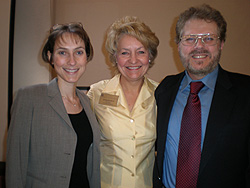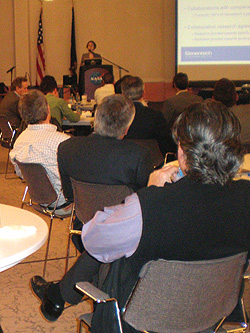UCSC officials joined industry representatives last week for a panel discussion on the benefits of industry-university partnerships in Silicon Valley. They provided the audience with insights into managing successful research and development partnerships.
Nirvikar Singh, Special Advisor to the Chancellor for the School of Management, noted the economic benefits of such collaborations.
"Universities such as Bologna and Oxford are the oldest continuously functioning institutions in the world. Since their founding, they have been critical to the success of their surrounding economies," said Singh, a professor of economics. "Modern industry-university partnerships offer the potential for cutting-edge research, as well as challenges of intellectual property management and culture alignment."
The panel, held on Tuesday, April 1, at the NASA Ames Conference Center, included Lou Witkin, program manager of the HP Labs Open Innovation Office; Anna Williamson, senior manager of business development at Genentech; William Berry, director of the UC-NASA Ames University Affiliated Research Center; and Gerald Barnett, director of UCSC's Office for Management of Intellectual Property. Steve Zornetzer, associate center director for institutions and research at NASA Ames, was the moderator.
Berry discussed UCSC's Silicon Valley Initiatives, which include the Bio-Info-Nano Research and Development Institute (BIN-RDI), UCSC Extension, and the proposed School of Management. Through these initiatives, UCSC is partnering with the NASA Ames Research Center and Silicon Valley industry in the development of the NASA Research Park.
"That is one of the most underutilized pieces of real estate in Silicon Valley, and it gives us a great opportunity," Berry said.
For universities, partnerships offer opportunities to engage students in open collaborations that bring new ideas forward to help shape industry and the world. According to Barnett, successful partnerships "create an entrepreneurial environment."
Witkin discussed the phases necessary to establish a partnership, noting that "if any one of the steps are skipped there will be less than optimal partnering."
Williamson said Genentech is interested in collaborations with universities because to continue to be creative they need "internal and external people to work at the forefront of science."




